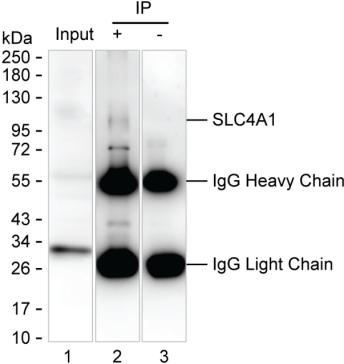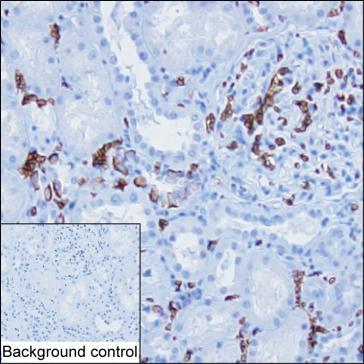

| WB | 咨询技术 | Human,Mouse,Rat |
| IF | 咨询技术 | Human,Mouse,Rat |
| IHC | 1/50-1/200 | Human,Mouse,Rat |
| ICC | 技术咨询 | Human,Mouse,Rat |
| FCM | 咨询技术 | Human,Mouse,Rat |
| Elisa | 1/5000-1/10000 | Human,Mouse,Rat |
| Host/Isotype | Mouse IgG1 |
| Antibody Type | Primary antibody |
| Storage | Store at 4°C short term. Aliquot and store at -20°C long term. Avoid freeze/thaw cycles. |
| Species Reactivity | Human |
| Immunogen | Purified recombinant fragment of human SLC4A1 |
| Formulation | Purified antibody in PBS with 0.05% sodium azide |
+ +
以下是3篇关于VEGF/VEGFA抗体的经典文献摘要示例(格式简化):
---
1. **文献名称**: "Bevacizumab (Avastin), a humanized anti-VEGF monoclonal antibody for cancer therapy"
**作者**: Ferrara N, et al.
**摘要**: 首次报道贝伐珠单抗(抗VEGF-A人源化单抗)的研发及在癌症治疗中的机制,通过阻断VEGF信号抑制肿瘤血管生成,临床试验显示可延长转移性结直肠癌患者生存期。
---
2. **文献名称**: "VEGF as a key mediator of angiogenesis in cancer"
**作者**: Hicklin DJ, Ellis LM.
**摘要**: 系统综述VEGF-A在肿瘤血管生成中的核心作用,并讨论抗VEGF抗体(如贝伐珠单抗)的靶向治疗策略及其在抑制肿瘤微环境中的临床应用潜力。
---
3. **文献名称**: "Structural basis for the blockade of VEGF signaling by a monoclonal antibody"
**作者**: Muller YA, et al.
**摘要**: 通过X射线晶体学解析抗VEGF抗体(如雷珠单抗)与VEGF-A的结合结构,揭示其通过特异性结合VEGF表位阻断VEGFR2受体激活的分子机制。
---
4. **文献名称**: "Dual blocking of VEGF and ANG2 with bispecific antibodies enhances anti-tumor efficacy"
**作者**: Huang Y, et al.
**摘要**: 提出一种新型双特异性抗体同时靶向VEGF-A和血管生成素-2(ANG2),在小鼠模型中显示出比单一抗体更强的抗肿瘤血管正常化效果,为克服抗VEGF治疗耐药性提供新策略。
---
注:以上为示例性文献摘要,实际文献可通过PubMed/Google Scholar搜索关键词(如"VEGF antibody therapy"、"anti-VEGF mechanism")获取最新研究。
Vascular endothelial growth factor A (VEGFA) is a key signaling protein involved in angiogenesis (formation of new blood vessels) and vascular permeability. It binds to receptors such as VEGFR-1 and VEGFR-2. triggering pathways that promote endothelial cell proliferation, migration, and survival. Dysregulation of VEGFA is linked to pathological conditions, including cancer, diabetic retinopathy, and age-related macular degeneration (AMD), where excessive angiogenesis contributes to disease progression.
VEGFA antibodies are therapeutic or research tools designed to neutralize VEGFA activity. Therapeutically, they inhibit abnormal blood vessel growth by blocking VEGFA from interacting with its receptors. For example, bevacizumab (Avastin®), a humanized monoclonal antibody, is widely used in cancer treatment and off-label for eye diseases. Ranibizumab (Lucentis®), a Fab fragment derived from bevacizumab, is FDA-approved for AMD. These antibodies reduce tumor vascularization, limit metastatic potential, and improve outcomes in retinal disorders by decreasing edema and hemorrhage.
In research, anti-VEGFA antibodies are essential for detecting VEGFA expression in tissues (via immunohistochemistry) or quantifying its levels in biological samples (using ELISA). They also help study angiogenesis mechanisms in experimental models. Challenges include managing side effects like impaired wound healing or hypertension in clinical use. Ongoing research focuses on optimizing antibody specificity, delivery methods, and combination therapies to enhance efficacy while minimizing adverse effects.
×